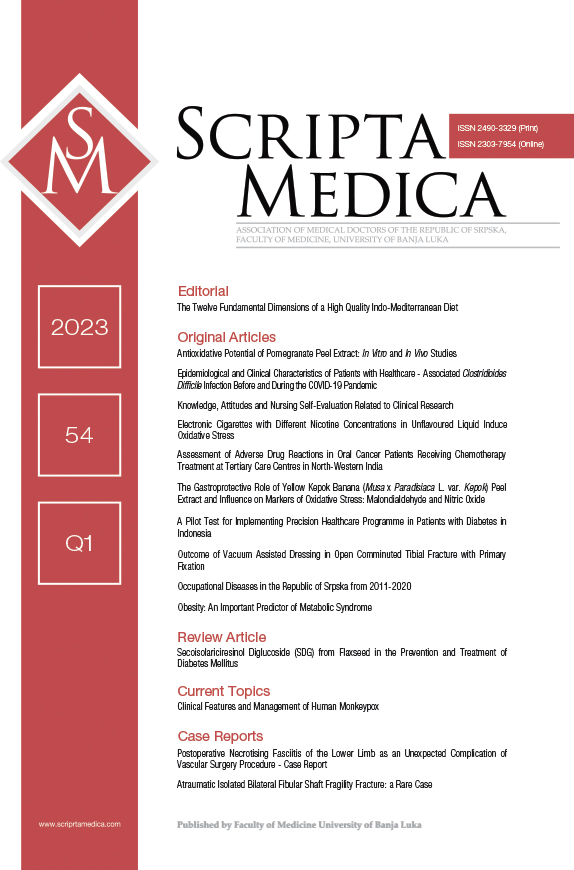Znanje, stavovi i samoevaluacija medicinskih sestara u vezi sa kliničkim istraživanjima
Sažetak
Background/Aim. Clinical research nurse is a well-known concept in Europe and other countries. The purpose of this study was to investigate the nurses’ knowledge and attitudes towards clinical research and their opinions and self-evaluation about clinical research nursing, and factors affecting them.
Methods. A cross sectional study was conducted at the University Clinical Centre of the Republic of Srpska (UCCRS). A questionnaire included 50 questions/statements was created in order to address the aims of the research and afterwards distributed to 120 nurses from 6 departments.
Results. Response rate was 91.6 %. Most of the respondents showed a low level of knowledge, but positive attitude related to clinical research. Nurses who participated in clinical research were confident in their competencies according to their self-evaluation.
Conclusion. Systematic approach to the additional nurses education could have a significant impact on a success of clinical research.
Reference
1. Downing A, Morris EJA, Corrigan N, Sebag-Montefiore D, Finan PJ, Thomas JD, et al. High hospital research participation and improved colorectal cancer survival outcomes: a population-based study. Gut 2017;66(1):89–96.
2. Gallin JI, Ognibene FP. Principles and practice of clinical research. Academic Press; 2012.
3. Grady C, Edgerly M. Science, technology, and innovation: Nursing responsibilities in clinical research. Nurs Clin 2009;44(4):471–81.
4. Green L. Explaining the role of the nurse in clinical trials. Nurs Stand 2011 Feb 2-8;25(22):35-9.
5. Vijayananthan A, Nawawi O. The importance of Good Clinical Practice guidelines and its role in clinical trials. Biomed Imaging Interv J 2008;4(1). doi: 10.2349/biij.4.1.e5.
6. Aksoy HB, Arici MA, Reyhan U, Gelal A. Nurses’ knowledge, attitudes and opinions towards clinical research: A cross-sectional study in a university hospital. J Basic Clin Heal Sci 2018;2(2):38–44.
7. The Agency for medicinal products and medical devices Bosnia and Herzegovina [Internet]. [Cited 26 Jan 2023]. Available from: http://www.almbih.gov.ba
8. University Clinical Centre of the Republic of Srpska, Banja Luka. List of clinical studies approved by the ethics committee of the University Clinical Centre of the Republic of Srpska [Internet]. [Cited: 26-Jan-2023]. Available from: https://www.kc-bl.com/En/
9. Jakirović M. [The role of the nurse in conducting clinical trials]. University of Zagreb. School of Medicine. Department of Internal Medicine; 2020. Croatian.
10. Organisation for Economic Co-operation and Development (OECD). Facilitating international co-operation in non-commercial clinical trials 2011 [Internet]. [Cited 26 Jan 2023]. Available from: http://www.oecd.org/sti/inno/49344626.pdf
11. Wissenschaftsrat D. [Clinical trial recommendations] (Drs. 7301-18). Hannover 2018. German.
12. Magnin A, Iversen VC, Calvo G, Čečetková B, Dale O, Demlová R, et al. European survey on national training activities in clinical research. Trials 2019;20(1):1–9.
13. Agency for Medicinal Products and Medical Devices of Bosnia and Herzegovina. Ordinance on clinical trials on medicinal products and medical devices [Internet]. [Cited 26 Jan 2023]. Available from: http://www.almbih.gov.ba/en/_doc/regulative/ordinance_on_clinical_trials_on_medicinal_products_and_medical_devices.pdf.
14. Brinkman-Denney S. An international comparison of the clinical trials nurse role. Nurs Manag (Harrow) 2013 Dec;20(8):32-40.
15. Smirnoff M, Ramirez M, Kooplimae L, Gibney M, McEvoy MD. Nurses’ attitudes toward nursing research at a metropolitan medical center. Appl Nurs Res 2007;20(1):24–31.
16. Matsumoto K, Nagamura F, Ogami Y, Yamashita N, Kamibeppu K. Difficulties of nursing staff involved in phase 1 oncology trials in Japan. Cancer Nurs 2011;34(5):369–75.
17. Yanagawa H, Takai S, Yoshimaru M, Miyamoto T, Katashima R, Kida K. Nurse awareness of clinical research: a survey in a Japanese University Hospital. BMC Med Res Methodol 2014;14:1–8.
18. Ulrich CM, Zhou Q, Ratcliffe SJ, Ye L, Grady C, Watkins-Bruner D. Nurse Practitioners’ attitudes about cancer clinical trials and willingness to recommend research participation. Contemp Clin Trials 2012;33(1):76–84.
19. Poston RD, Buescher CR. The essential role of the clinical research nurse (CRN). Urol Nurs 2010;30(1):55–63.
20. Roll L, Stegenga K, Hendricks-Ferguson V, Barnes YJ, Cherven B, Docherty SL, et al. Engaging nurses in research for a randomized clinical trial of a behavioral health intervention. Nurs Res Pract 2013;2013:183984. doi: 10.1155/2013/183984.
21. Spilsbury K, Petherick E, Cullum N, Nelson A, Nixon J, Mason S. The role and potential contribution of clinical research nurses to clinical trials. J Clin Nurs 2008;17(4):549–57.
22. Burnett CB, Koczwara B, Pixley L, Blumenson LE, Hwang YT, Meropol NJ. Nurses’ attitudes toward clinical trials at a comprehensive cancer center. Oncol Nurs Forum 2001 Aug;28(7):1187-92.
23. Michaels M, D’Agostino TA, Blakeney N, Weiss ES, Binz-Scharf MC, Golant M, et al. Impact of primary care provider knowledge, attitudes, and beliefs about cancer clinical trials: implications for referral, education and advocacy. J Cancer Educ 2015;30:152–7.
24. Rice J, Cheak TL. The role of nursing in hospital-based clinical research. Am J Nurs 2000;100(6):24E-24H.
25. Sadler GR, Lantz JM, Fullerton JT, Dault Y. Nurses’ unique roles in randomized clinical trials. J Prof Nurs 1999;15(2):106–15.
- Authors retain copyright and grant the journal right of first publication with the work simultaneously licensed under a Creative Commons Attribution License that allows others to share the work with an acknowledgement of the work's authorship and initial publication in this journal.
- Authors are able to enter into separate, additional contractual arrangements for the non-exclusive distribution of the journal's published version of the work (e.g., post it to an institutional repository or publish it in a book), with an acknowledgement of its initial publication in this journal.
- Authors are permitted and encouraged to post their work online (e.g., in institutional repositories or on their website) prior to and during the submission process, as it can lead to productive exchanges, as well as earlier and greater citation of published work (See The Effect of Open Access).

